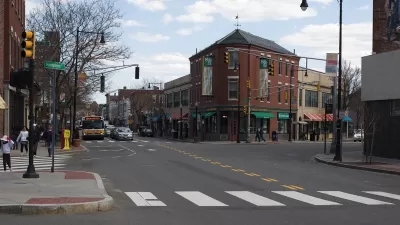The policy is aimed at reducing the cost of building affordable housing and helping affordable housing developers to better compete on property acquisitions.

When the city of Cambridge passed its 100 Percent Affordable Housing Overlay (AHO) ordinance in October of 2020, supporters hoped it would "reduce affordable housing development costs by 10 to 15 percent per leasable square foot" and make it more possible to build affordable housing in the city. Andrew Gibbs analyzes the key provisions of the ordinance, which include a requirement that "at least 80 percent of rental dwellings (or 50 percent of for-sale dwelling units)" in a district " are dedicated to households making up to 80 percent of Area Median Income (AMI)" as well as exemptions related to height and density limits, parking requirements, and lot coverage. "The AHO removes off-street parking requirements, unless needed to conform to other laws," eliminating the need to build costly parking, which costs $25,752 per surface parking space in the Boston metro area.
"The AHO gives property owners the 'as-of-right' ability to develop affordable housing in Cambridge," a measure designed to "reduce execution risks and give lenders more confidence to provide land acquisition and pre-construction loans." Though the exact potential impacts are hard to quantify, the new provisions "should help affordable developers make competitive offers for developable land in Cambridge" and, if the reduction in development costs holds true at 10 to 15 percent, "the effect of the AHO should be an equivalent increase in affordable housing units built each year." While the AHO will not entirely solve Cambridge's housing issues, "the AHO has the potential to add a material number of new affordable homes and set a new industry standard for cities using comprehensive zoning tools alleviate affordability burdens."
FULL STORY: WHAT CAN WE EXPECT FROM CAMBRIDGE’S NEW AFFORDABLE HOUSING OVERLAY?

Trump Administration Could Effectively End Housing Voucher Program
Federal officials are eyeing major cuts to the Section 8 program that helps millions of low-income households pay rent.

Planetizen Federal Action Tracker
A weekly monitor of how Trump’s orders and actions are impacting planners and planning in America.

Ken Jennings Launches Transit Web Series
The Jeopardy champ wants you to ride public transit.

California Invests Additional $5M in Electric School Buses
The state wants to electrify all of its school bus fleets by 2035.

Austin Launches $2M Homelessness Prevention Fund
A new grant program from the city’s Homeless Strategy Office will fund rental assistance and supportive services.

Alabama School Forestry Initiative Brings Trees to Schoolyards
Trees can improve physical and mental health for students and commnity members.
Urban Design for Planners 1: Software Tools
This six-course series explores essential urban design concepts using open source software and equips planners with the tools they need to participate fully in the urban design process.
Planning for Universal Design
Learn the tools for implementing Universal Design in planning regulations.
Ada County Highway District
Clanton & Associates, Inc.
Jessamine County Fiscal Court
Institute for Housing and Urban Development Studies (IHS)
City of Grandview
Harvard GSD Executive Education
Toledo-Lucas County Plan Commissions
Salt Lake City
NYU Wagner Graduate School of Public Service





























